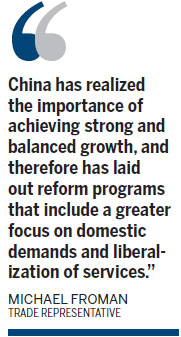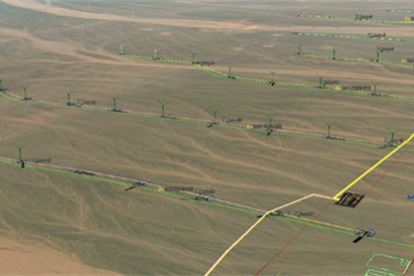Balanced trade with China key: US official

China's reforms geared toward moving away from an export-dependent model will help balance its trading relationship with the United States, said the US trade representative in Beijing.
"China has realized the importance of achieving strong and balanced growth, and therefore has laid out reform programs that include a greater focus on domestic demands and liberalization of services," Trade Representative Michael Froman said at a media roundtable on Nov 8 in Beijing.
"It can help balance out China's relationships with the rest of the global trading systems," he added.
As US President Barack Obama's principal adviser on international trade and investment issues, Froman is attending the 2014 Asia-Pacific Economic Cooperation (APEC) Economic Leaders' Week in Beijing. Obama will arrive in Beijing on Monday for this year's economic leaders' meeting and later bilateral talks with Chinese President Xi Jinping.
Washington's economic priority toward Beijing lies in further advancing negotiations over the Bilateral Investment Treaty, which will build a "high-standard foundation" for new cooperation, Froman said.
"We have been working through key elements of the texts over the years, but there is still much to be done," he said. "It is a significant undertaking because of the changes and reforms it means to China's investment system," he said.
The BIT negotiations, which began in 2008, were revitalized at the fifth round of the China-US Strategic and Economic Dialogue last year.

Froman said the two countries at the world's economic forefront have engaged in "useful and productive" discussions through mechanisms such as the Strategic and Economic Dialogue or the Joint Commission on Commerce and Trade as well as ongoing dialogues in areas such as technology, science, energy and climate change.
"The US is always keen to broaden and deepen economic ties with China, no matter in dealing with outstanding trade and investment issues or laying out frameworks for mutual investment relationship," he said.
In September, the US trade deficit with China hit a record high of more than $35 billion, making up 80 percent of the US' total trade gap, according to US Commerce Department released data last week.
Lauding APEC as "a useful forum for integrating regional economies and incubating new ideas", Froman said the realization of the Free Trade Agreement of the Asia-Pacific does not conflict with what Washington is focusing on in trade facilitation across the region - the Trans Pacific Partnership Agreement.
In recent years, subregional trading blocs such as the TPP and the Regional Comprehensive Economic Partnership have emerged in the Asia-Pacific, drawing criticism for what seems to be a fragmenting of economic integration among APEC members.
"I do not see any conflicts, because FTAAP is not about launching new negotiations," Froman said."It has to be pushed outside of APEC through mechanisms like TPP and RCEP."
"TPP as a mechanism is recognized by all APEC leaders in 2010 as a pathway toward the aspiration of FTAAP," he added.
On Saturday, a ministerial meeting of the 12 negotiating TPP economies, including the US and Japan, was held outside of the APEC sessions. One day earlier, Chinese Commerce Ministry spokesman Shen Danyang said China remains open to TPP and pays close attention to the negotiating process.
Froman said TPP is intended to be a platform. "Countries that are able and willing to meet the high standards can join with the consent of all members," he said.
The contribution of TPP would be to eliminate tariff and non-tariff barriers across the region and also to adopt a series of high-standard disciplines in various areas, such as property rights and the digital economy and labor environment, Froman said.
(China Daily USA 11/10/2014 page1)
Today's Top News
- China's annual express delivery volume tops 170 billion
- Recruiters seek overseas graduates
- 2025 a crucial year to reflect on history
- Beijing, Washington agree to manage differences
- RMB expected to stay resilient, rebound despite headwinds
- 'Ice City' warms up for winter Games






























